 | –≠–ª–µ–∫—Ç—Ä–æ–Ω–Ω—ã–π –∫–æ–º–ø–æ–Ω–µ–Ω—Ç: 403CNQ | –°–∫–∞—á–∞—Ç—å:  PDF PDF  ZIP ZIP |
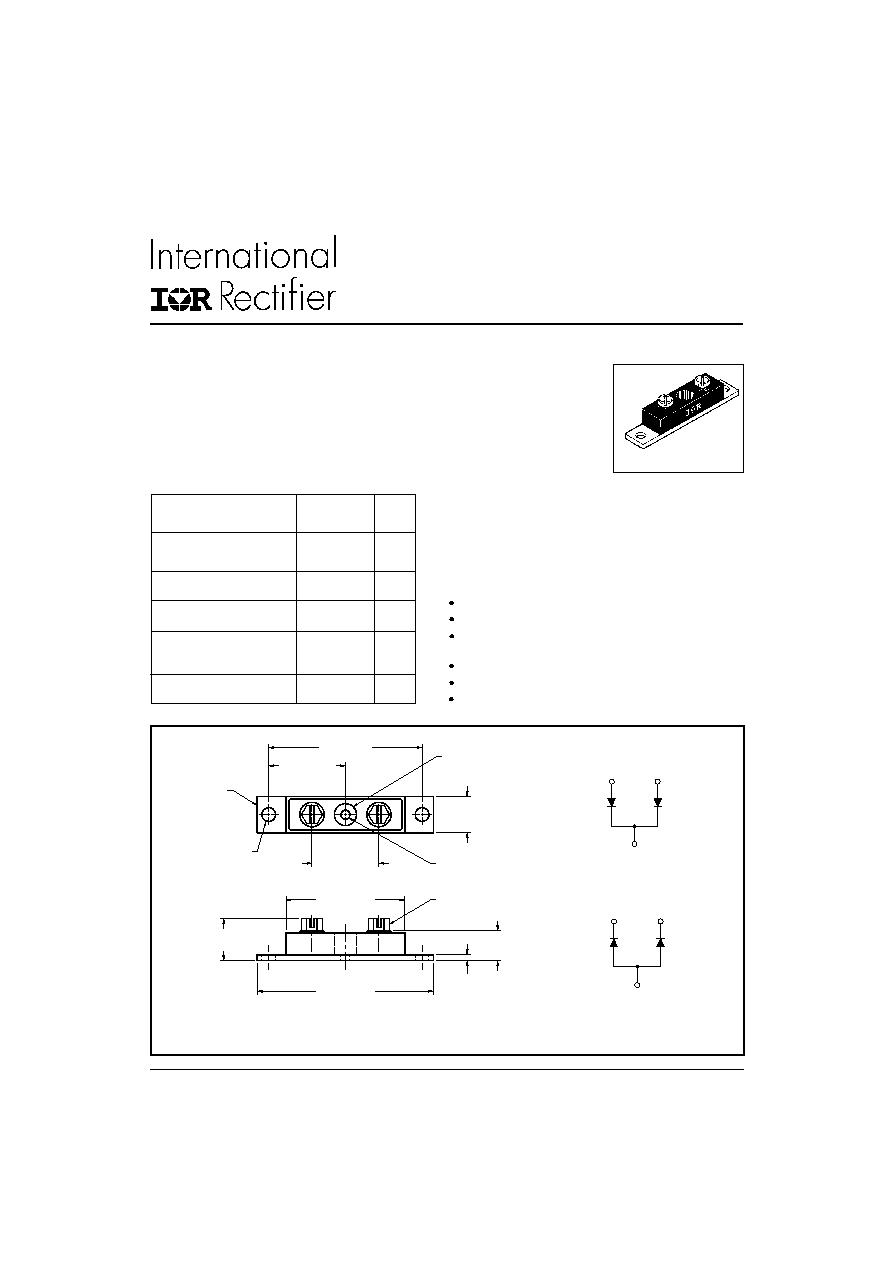
I
F(AV)
Rectangular
400
A
waveform
V
RRM
range
80 to 100
V
I
FSM
@ tp = 5 µs sine
25,500
A
V
F
@
200Apk, T
J
=125∞C
0.69
V
(per leg)
T
J
range
- 55 to 175
∞C
Characteristics
403CNQ... Units
Major Ratings and Characteristics
The 403CNQ center tap Schottky rectifier module series has
been optimized for low reverse leakage at high temperature.
The proprietary barrier technology allows for reliable opera-
tion up to 175 ∞C junction temperature. Typical applications
are in high current switching power supplies, plating power
supplies, UPS systems, converters, free-wheeling diodes,
welding, and reverse battery protection.
175 ∞C T
J
operation
Center tap module
High purity, high temperature epoxy encapsulation for
enhanced mechanical strength and moisture resistance
Low forward voltage drop
High frequency operation
Guard ring for enhanced ruggedness and long term
reliability
Description/Features
TO-244AB
SCHOTTKY RECTIFIER
400 Amp
Bulletin PD-2.214 rev. E 05/02
1
www.irf.com
403CNQ...(R) SERIES
63.50 [2.500]
60.96 [2.400]
23.55 [.927]
20.42 [.804]
14.99 [.590]
15.75 [.620]
20.32 [.800]
17.78 [.700]
39.75 [1.565]
40.26 [1.585]
80.01 [3.150]
34.925 [1.375]
3.35 [.132]
3.02 [.119]
90.17 [3.550]
92.71 [3.650]
7.49 [.295]
6.99 [.275]
2X ÿ
10.41 [.410]
9.65 [.380]
ÿ
4.70 [.185]
4.95 [.195]
1/4-20 SLOTTED HEX
COMMON
CATHODE
REF.
ÿ
NOTES:
1. DIMENSIONS ARE SHOWN IN MILLIMETERS [INCHES].
2. CONTROLLING DIMENSION: MILLIMETER
403CNQ100
403CNQ100(R)
Lug
Terminal
Anode 1
Lug
Terminal
Anode 2
Base
Common Cathode
Base
Common Anode
Lug
Terminal
Cathode 1
Lug
Terminal
Cathode 2
Modified JEDEC
Outline TO-244AB
Dimensions in millimeters and (inches)
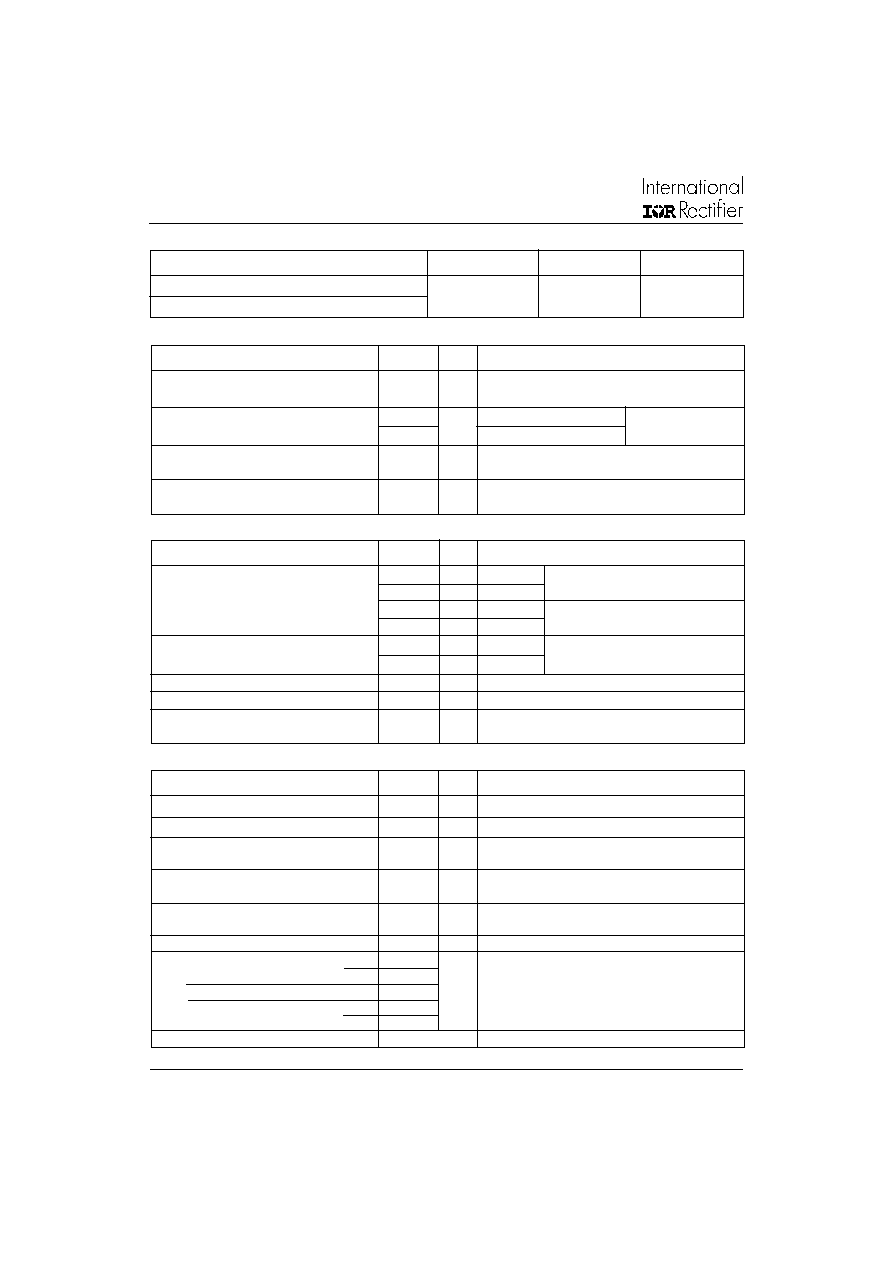
403CNQ...(R) Series
2
Bulletin PD-2.214 rev. E 05/02
www.irf.com
Absolute Maximum Ratings
Following any rated
load condition and with
rated V
RRM
applied
A
I
F(AV)
Max. Average Forward Current
400
A
50% duty cycle @ T
C
= 105 ∞C, rectangular wave form
* See Fig. 5
I
FSM
Max. Peak One Cycle Non-Repetitive
25,500
5µs Sine or 3µs Rect. pulse
Surge Current (Per Leg) * See Fig. 7
3300
10ms Sine or 6ms Rect. pulse
E
AS
Non-Repetitive Avalanche Energy
15
mJ
T
J
= 25 ∞C, I
AS
= 1 Amps, L = 30 mH
(Per Leg)
I
AR
Repetitive Avalanche Current
1
A
Current decaying linearly to zero in 1 µsec
(Per Leg)
Frequency limited by T
J
max. V
A
= 1.5 x V
R
typical
(1) Pulse Width < 300µs, Duty Cycle <2%
T
J
Max. Junction Temperature Range
-55 to 175
∞C
T
stg
Max. Storage Temperature Range
-55 to 175
∞C
R
thJC
Max. Thermal Resistance Junction
0.20
∞C/W DC operation
* See Fig. 4
to Case (Per Leg)
R
thJC
Max. Thermal Resistance Junction
0.10
∞C/W DC operation
to Case (Per Package)
R
thCS
Typical Thermal Resistance, Case
0.10
∞C/W Mounting surface, smooth and greased
to Heatsink
wt
Approximate Weight
79 (2.80)
g (oz.)
T
Mounting Torque Base
Min.
24 (20)
Max.
35 (30)
Mounting Torque Center Hole
Typ.
13.5 (12)
Terminal Torque
Min.
35 (30)
Max.
46 (40)
Case Style
TO - 244AB
Modified JEDEC
Thermal-Mechanical Specifications
Parameters
403CNQ Units Conditions
V
FM
Max. Forward Voltage Drop
0.83
V
@ 200A
(Per Leg) * See Fig. 1
(1)
0.97
V
@ 400A
0.69
V
@ 200A
0.82
V
@ 400A
I
RM
Max. Reverse Leakage Current
6
mA
T
J
= 25 ∞C
(Per Leg) * See Fig. 2
(1)
80
mA
T
J
= 125 ∞C
C
T
Max. Junction Capacitance (Per Leg)
5500
pF
V
R
= 5V
DC
(test signal range 100Khz to 1Mhz) 25∞C
L
S
Typical Series Inductance (Per Leg)
5.0
nH
From top of terminal hole to mounting plane
dv/dt Max. Voltage Rate of Change
10000
V/ µs
(Rated V
R
)
T
J
= 25 ∞C
T
J
= 125 ∞C
V
R
= rated V
R
Parameters
403CNQ Units Conditions
Kg-cm
(Ibf-in)
Electrical Specifications
Parameters
403CNQ Units Conditions
Part number
403CNQ080
403CNQ090
403CNQ100
V
R
Max. DC Reverse Voltage (V)
V
RWM
Max. Working Peak Reverse Voltage (V)
Voltage Ratings
80
90
100
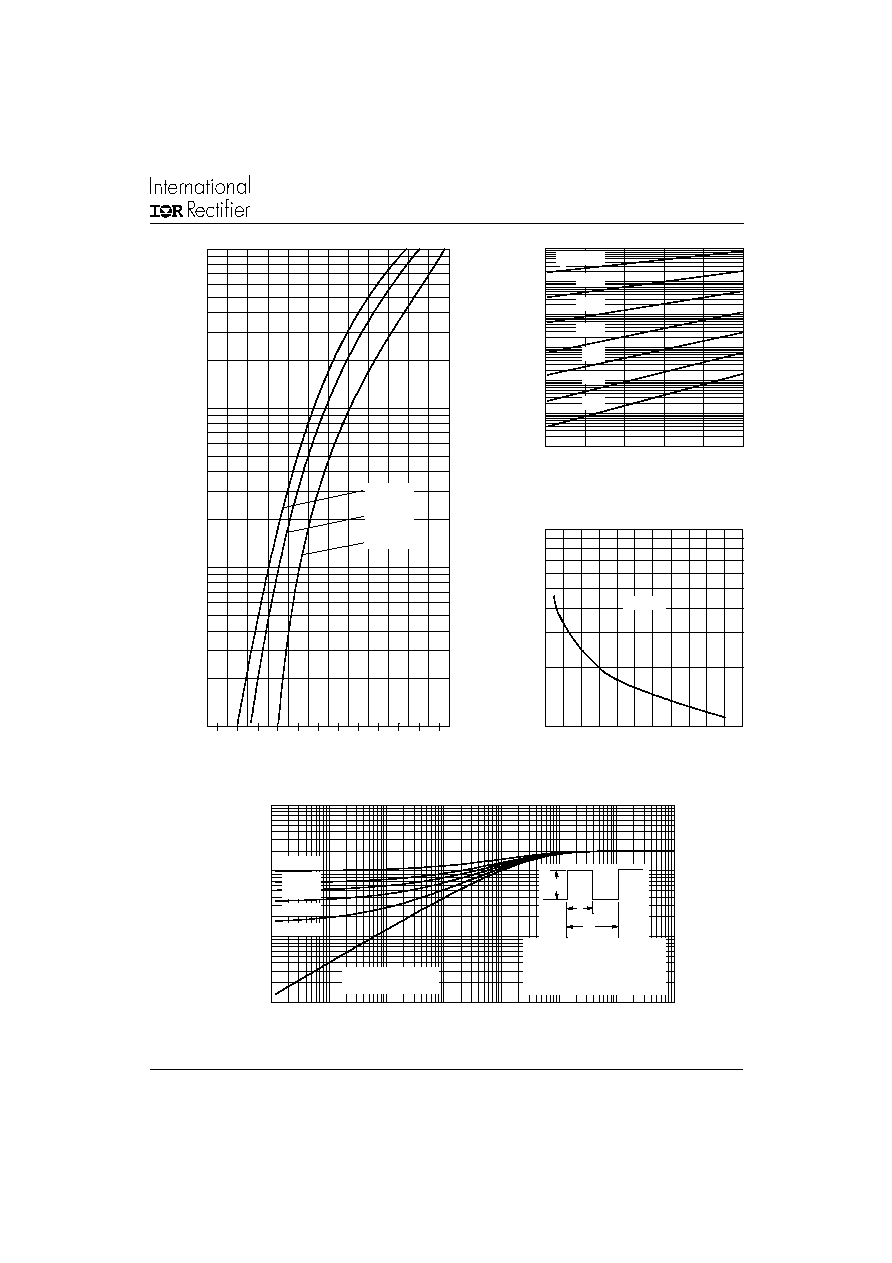
403CNQ...(R) Series
3
Bulletin PD-2.214 rev. E 05/02
www.irf.com
Fig. 2 - Typical Values Of Reverse Current
Vs. Reverse Voltage (Per Leg)
Fig. 3 - Typical Junction Capacitance
Vs. Reverse Voltage (Per Leg)
Fig. 4 - Max. Thermal Impedance Z
thJC
Characteristics (Per Leg)
Fig. 1 - Max. Forward Voltage Drop Characteristics
(Per Leg)
.001
.01
.1
1
10
100
1000
0
20
40
60
80
100
T = 175∞C
150∞C
125∞C
100∞C
75∞C
50∞C
25∞C
J
1
10
100
1000
0 .1 .2 .3 .4 .5 .6 .7 .8 .9 1 1.1 1.2
F
T = 175∞C
T = 125∞C
T = 25∞C
J
J
J
F
d V lt
D V (V)
1000
10000
0 10 20 30 40 50 60 70 80 90 100110
T = 25∞C
J
.001
.01
.1
1
.00001
.0001
.001
.01
.1
1
10
100
D = 0.33
D = 0.50
D = 0.25
D = 0.17
D = 0.08
Single Pulse
(Thermal Resistance)
2
t
1
t
P
DM
Notes:
1. Duty factor D = t / t
2. Peak T = P x Z + T
1
J
DM thJC C
2
Reverse Voltage - V
R
(V)
Reverse Current - I
R
(mA)
Junction Capacitance - C
T
(p F)
Reverse Voltage - V
R
(V)
Instantaneous Forward Current - I
F
(A)
Forward Voltage Drop - V
FM
(V)
t
1
, Rectangular Pulse Duration (Seconds)
Thermal Impedance Z
thJC
(∞C/W)
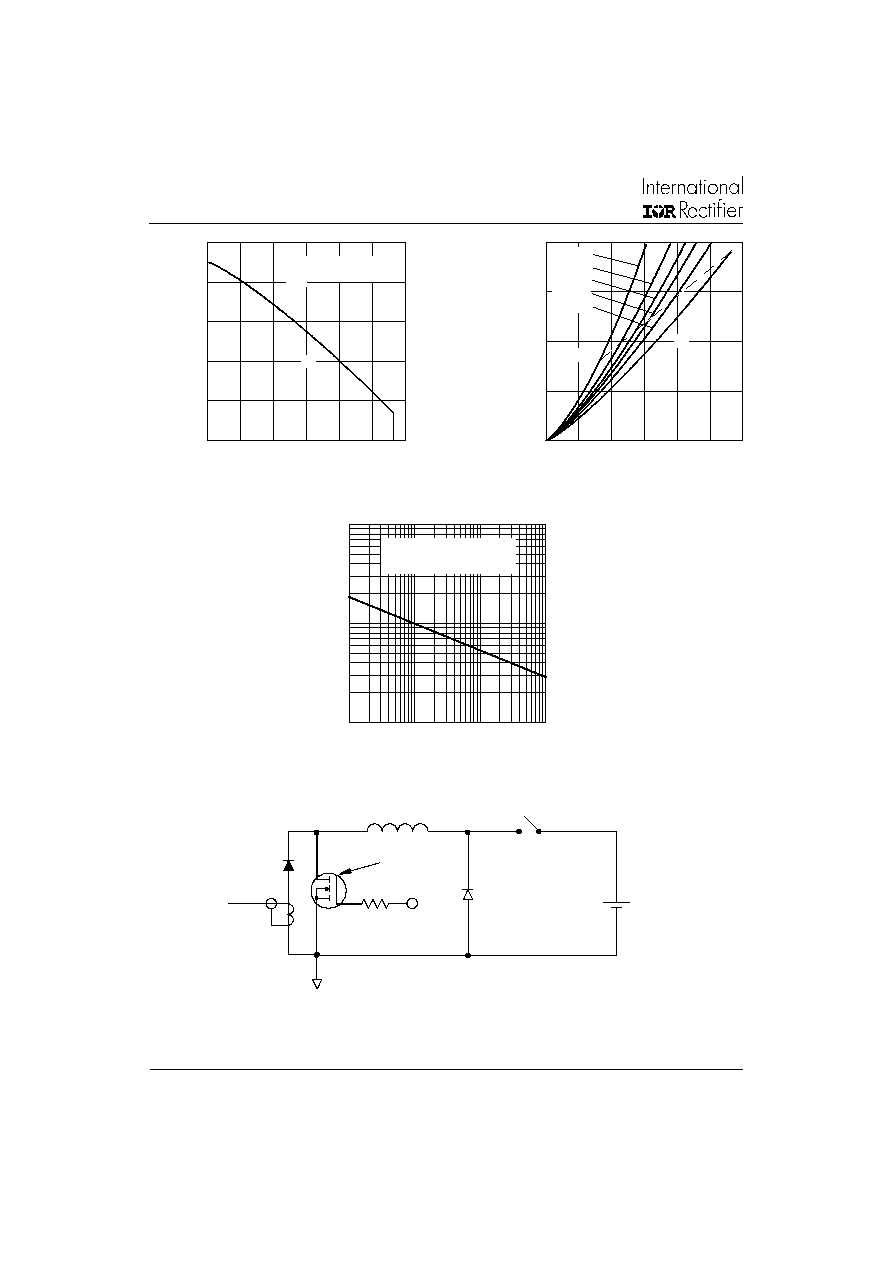
403CNQ...(R) Series
4
Bulletin PD-2.214 rev. E 05/02
www.irf.com
Fig. 7 - Max. Non-Repetitive Surge Current (Per Leg)
Fig. 5 - Max. Allowable Case Temperature
Vs. Average Forward Current (Per Leg)
Fig. 8 - Unclamped Inductive Test Circuit
Fig. 6 - Forward Power Loss Characteristics
(Per Leg)
130
140
150
160
170
180
0
50
100
150
200
250
300
DC
403CNQ
R (DC) = 0.20∞C/W
thJC
0
50
100
150
200
0
50
100
150
200
250
300
DC
D = 0.08
D = 0.17
D = 0.25
D = 0.33
D = 0.50
RMS Limit
1000
10000
100000
10
100
1000
10000
At Any Rated Load Condition
And With Rated V Applied
Following Surge
RRM
FRE E-W H EEL
D IO D E
40H FL40 S02
C UR RE N T
M O N ITO R
H IG H-SPE ED
SW ITC H
IRFP460
L
D UT
R g = 25 oh m
V d = 25 V olt
+
Average Forward Current - I
F(AV)
(A)
Allowable Case Temperature (∞C)
Average Forward Current - I
F(AV)
(A)
Average Power Loss (Watts)
Square Wave Pulse Duration - t
p
(microsec)
Non-Repetitive Surge Current - I
FSM
(A)
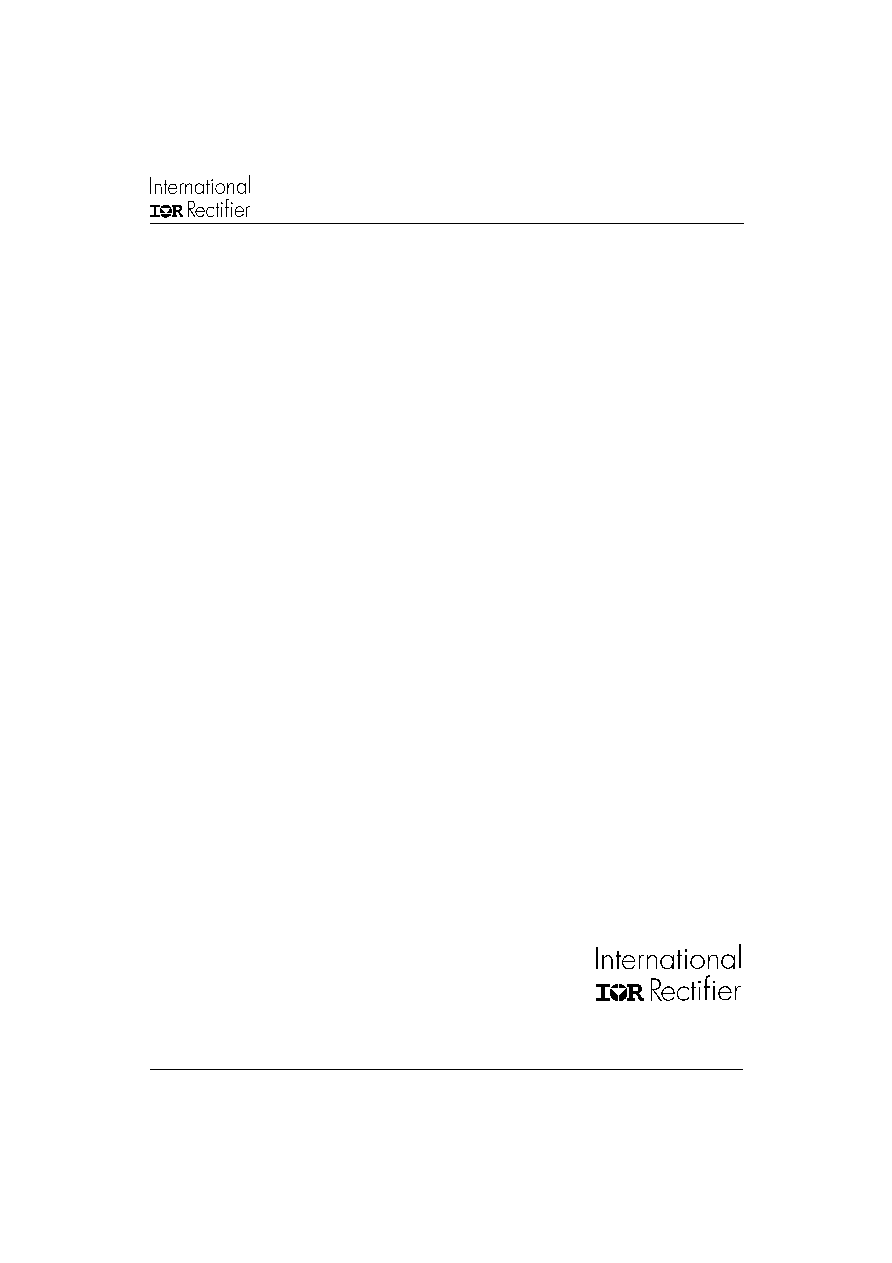
403CNQ...(R) Series
5
Bulletin PD-2.214 rev. E 05/02
www.irf.com
IR WORLD HEADQUARTERS: 233 Kansas St., El Segundo, California 90245, USA Tel: (310) 252-7105
TAC Fax: (310) 252-7309
Visit us at www.irf.com for sales contact information. 05/02
Data and specifications subject to change without notice.
This product has been designed and qualified for Industrial Level.
Qualification Standards can be found on IR's Web site.




